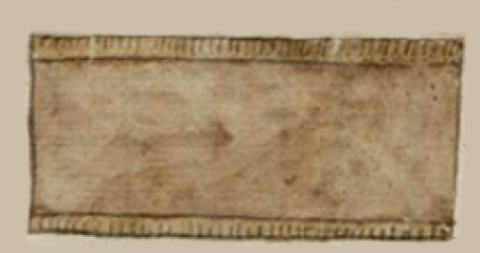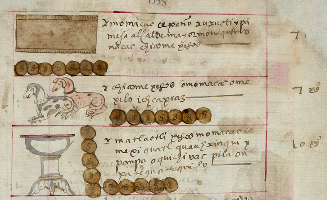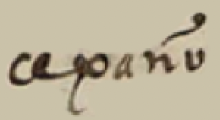paño (CST17)
This painting of the simplex glyph for the term paño (probably woolen cloth, especially here, where there were sheep), a loanword from Spanish, shows a large rectangle with fringe along the longer edges. The companion text describes it as green, but today it appears brown. The text also explains that this cloth was destined for the table of the Alcalde Mayor, a Spanish colonial official.
Stephanie Wood
For more on the Codex Sierra, see Kevin Terraciano’s study (2021).
Stephanie Wood
1550–1564
Jeff Haskett-Wood
telas, paños, manteles

paño, cloth, often woolen (a loanword from Spanish), https://nahuatl.wired-humanities.org/content/pa%C3%B1o-0
paño o mantel
Stephanie Wood
Códice Sierra-Texupan, plate 17, page dated 1558. Origin: Santa Catalina Texupan, Mixteca Alta, State of Oaxaca. Kevin Terraciano has published an outstanding study of this manuscript (Codex Sierra, 2021), and in his book he refers to alphabetic and “pictorial” writing, not hieroglyphic writing. We are still counting some of the imagery from this source as hieroglyphic writing, but we are also including examples of “iconography” where the images verge on European style illustrations or scenes showing activities. We have this iconography category so that such images can be fruitfully compared with hieroglyphs. Hieroglyphic writing was evolving as a result of the influence of European illustrations, and even alphabetic writing impacted it.
https://bidilaf.buap.mx/objeto.xql?id=48281&busqueda=Texupan&action=sear...
The Biblioteca Digital Lafragua of the Biblioteca Histórica José María Lafragua in Puebla, Mexico, publishes this Códice Sierra-Texupan, 1550–1564 (62pp., 30.7 x 21.8 cm.), referring to it as being in the “Public Domain.” This image is published here under a Creative Commons license, asking that you cite the Biblioteca Digital Lafragua and this Visual Lexicon of Aztec Hieroglyphs.






